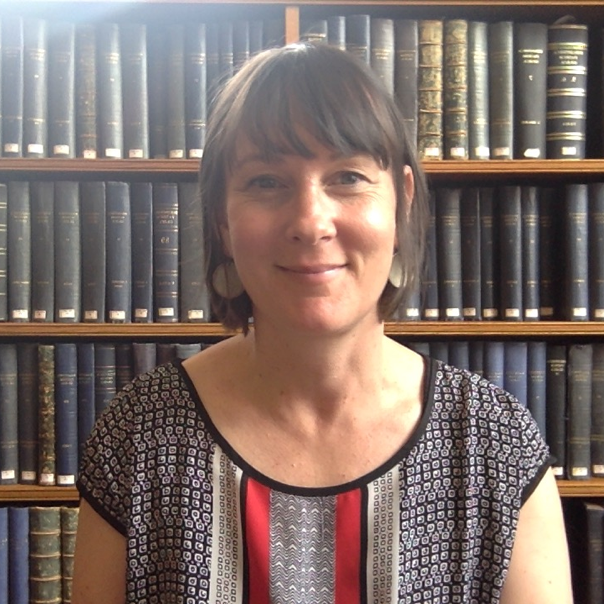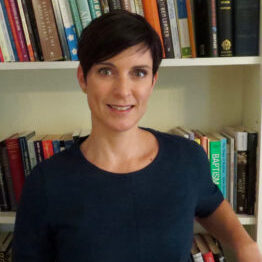Episode Transcript
[00:00:05] Speaker A: You're listening to by the well, a.
[00:00:06] Speaker B: Lectionary based podcast for preachers recorded on.
[00:00:09] Speaker A: The land of the Wurundjeri people.
Now, when these things begin to take place, stand up and raise your heads because your redemption is drawing near.
Hi, everyone, I'm Robyn Whittaker, and we are here at the beginning of a new church year. So happy Advent, if that's even an appropriate greeting. And I'm delighted that joining me today is my colleague and friend, the Reverend Professor Dorothy Lee, who is Stuart professor of New Testament Theology at Trinity Theological School in the University of Divinity, and she is stepping in as our guest co host for the Advent season. So welcome, Dorothy.
[00:00:57] Speaker B: Thank you, Robert. Robyn, it's lovely to be here.
[00:00:59] Speaker A: Great to have you back. And if I didn't say it, Dorothy's also an Anglican priest who does preach regularly in her congregation and around the church as well. So, Dorothy, we're in the season of Advent. Oh, I should say the readings first. We're going to talk today particularly about Jeremiah 33, 14, 16, and then the gospel reading, Luke 21:25 to 36. But before we do that, we're in a season of Advent. What do we need to know about the Advent season, or what for you are some of the qualities of preaching in Advent and this liturgical time of year?
[00:01:36] Speaker B: Yes, I think what you said is right. It's the beginning of the church's year. New Year's Day is Advent Sunday, and the readings are very focused on the future coming of the Son of Man. So we begin the church's year looking to the future. And we're not looking to our own future because that looks pretty dismal at the moment, but we're looking to God's future that is already stretching its arm back, drawing us into God's future. And that's essentially what it's about. So we begin the year, oddly enough, although we think of it as a preparation for Christmas, it's not primarily a preparation for Christmas at all. It's actually it has its own identity. So we're looking to God's future, God's promises for the future that are already being fulfilled among us. And that means that the mood of Advent, instead of the kind of more penitential mood of Lent, where we think about sin and evil in the world and in our own hearts, we're thinking here about longing, the longing for justice, the longing for love, the longing for truth, all those sort of deep human longings that we believe are fulfilled in God, in Jesus, through the work of the Holy Trinity. So it's a move of longing, of yearning, I would say was the mood of Advent.
[00:03:04] Speaker A: Yeah, I really like that. And the tying it to being the church's New year in this future. I mean, one very pragmatic way to ground that for people might be the fact that often in our normal calendar year, as we have New Year's Eve and New Year's Day, we often plan for the future. We think, what are we hoping for this year? We often have lofty, sometimes ridiculous goals about all the things we're going to achieve for the year. This takes us to a more cosmic scale. But it is that forward looking that you've named.
[00:03:35] Speaker B: Yes, absolutely.
[00:03:36] Speaker A: I was reading recently that the four weeks of Advent in the church calendar used to, as part of focusing on the future, used to focus on the rather sober themes of death, judgment, heaven and hell have been traditional Advent themes. But now for those of you who do have liturgies, where perhaps you have the Advent candles in church, it tends to be hope, peace, joy and love. So we're here in this first Sunday of Advent theme of hope, which of course is again tied to hope in God's future, hope in God's promises. So we're going to see those themes in our readings.
[00:04:16] Speaker B: Yes, exactly.
[00:04:18] Speaker A: So let's go to Jeremiah 33, and the lectionary just gives us a couple of verses 14 to 16. I think a bit of context is useful here for people who don't know Jeremiah very well.
Jeremiah, this is in at the beginning of the chapter, we're told Jeremiah's in prison and the word of the Lord comes to him while he's still imprisoned under the guard. And all around him the world is kind of in a state of collapse. So we've got this sense in Jeremiah, in the prophecy of Jeremiah that God is delivering the kingdom, is delivering Israel into the hands of Nebuchadnezzar because the people have been unfaithful and failed to keep the covenant.
So this, it is a context. And we're going to get similar sort of context in Luke's gospel of anxiety, of fear, of change, of seeing the world around them sort of collapse. And yet the word of the Lord cuts in with this word of hope.
So in verse 14 it begins with, look, the days are coming when I will fulfil the good word that I spoke concerning the house of Israel. And this good word is earlier in the chapter where it uses language of healing, of peace, of restoration, of fortunes, of rebuilding and so on.
[00:05:42] Speaker B: Yes.
[00:05:43] Speaker A: What did you notice about Jeremiah or What do you think preachers should be attentive to?
[00:05:48] Speaker B: I think there's a kind of danger here that we need to be aware of, and that is that we as Christians, we read those verses and we forget the context that you've just outlined, and we think, oh, this is really about Jesus.
And it's not really about Jesus. It's about the word of hope that comes to Jeremiah in a time of chaos, anxiety, fear, all the things that you've been outlining, in fact, with the exile in mind or about to happen. So that it's important, I think, that we see that Jeremiah belongs in his own context.
At the same time, there may be a further meaning in Jeremiah that we can draw out that we would relate to, particularly to the coming of Jesus, but we can also relate to our own context. So as long as we're not doing a simple this is all really about Jesus, which I think is really sells Jeremiah short and fails to see the importance of context. So if we understand Jeremiah's context, then we can translate this into our own context. We can relate it to Jesus. And it's what one scholar has called, in a rather complicated phrase, there's a surplus of meaning. There's an extra layer of meaning that we can draw out because we read it also in the light of Jesus as well as in Jeremiah's own context. So I think sensitivity to that is really important.
So that's kind of one of the. Well, it's a danger, but it's also a positive thing because it enables us to say, oh, okay, so the days are coming. Well, those days we would understand to be fulfilled in Jesus. And yet Jesus has not fully come. Yet Jesus has come in one sense, but in another sense is still to come. So we can connect the Jeremiah context to the context in Jesus day and in the days of the New Testament.
And we can also connect it to our own context when we are experiencing the same sort of sense of catastrophe, which is, you know, the world falling apart around us, you know, wars and rumors of wars, everything that's actually going on in the world at the moment, which is quite frightening. And yet in the middle of that, the word of God, as you say, breaks in. And it can also break in. It's also capable of breaking in to our context to offer us, in the middle of all that pain and suffering, a sense of profound hope.
[00:08:24] Speaker A: Yeah, I think that's right. And I like this language of the surplus of meaning, because when we do that, you know, this obviously means this in a one for one kind of way, we are flattening the text. We're reducing it to one layer of meaning. And I mean, you and I have both spent our lifetimes studying these texts.
The more you go back, the more you discover like, these are rich in layers of meaning. Yes. And, yeah, we need to be careful not to flatten that. One of the images that really struck me, and we're going to get it in a different kind of way in the Luke passage, but is this image of a shoot. So using images from nature, from a tree, this language of a righteous shoot that will flourish for David. So we've got two bits of information there, and it might make you think of that other famous passage of the shoot shall come out of the stump of Jesse.
[00:09:16] Speaker B: Yes. In Isaiah. Yeah.
[00:09:18] Speaker A: So we get this in a number of prophetic texts. But this idea, at one level, it's a very simple human image that a dead tree or a winter tree sprouts springtime shoots and leaves, and it is a sign of hope and new life. So a very simple image that people can grasp. But the link to David is really important because of that covenant with David, that there will always be a leader in that Davidic line that God would not leave the people with, without a ruler or a king. And of course, when the New Testament writers talk about Jesus, they will start to talk about Jesus using these kinds of images and this kind of language.
But that's different to what you're saying. That's not saying this is only pointing to Jesus, but rather that New Testament authors will recognize the possibilities and frame Jesus in keeping with these possibilities, in terms of those.
[00:10:13] Speaker B: Yes, those images. And I think the point about the covenant, as you said, you know, it's seen as disobedience to the covenant. But so the people have let God down in relation to idolatry, in relation to social injustice, and they've let down their side of the covenant. But God doesn't let God's side down. So God remains faithful to the covenant. So the faithfulness of God is also underlining passages such as this, that God does not. There may be consequences, there may be punishment, but nevertheless God will restore.
And that's where the hope lies, I think, that God is always faithful to God's covenant, even when we fail. And the image of the dead tree sprouting a branch, we've all seen that happen, actually, in trees that have been cut down. I've got one in my. In my place at the moment where a shoot is coming out.
[00:11:06] Speaker A: Yeah, it's.
[00:11:07] Speaker B: It's precisely in A situation of hopelessness, of deadness, that. That new life where we think that there's no life possible, that life can actually come.
[00:11:17] Speaker A: Yeah. And that's so important. It makes me think of a book I read a while ago by a scholar called David Neuhauser that is called Hope in a Secular World. And one of the things he points out that I found really helpful was that hope is always linked with despair as sort of two sides of a coin.
So it's not optimism.
It's precisely a hope out of a situation of lack of hope. Right. You know, you don't have hope if you don't have some kind of despair or anxiety.
[00:11:49] Speaker B: Yes.
[00:11:49] Speaker A: So it is that shoot that comes out of death. You need both for the image to work.
[00:11:54] Speaker B: Yes, exactly. I like that. I like that thought. That hope and optimism are not the same things.
[00:11:58] Speaker A: Yes.
[00:11:59] Speaker B: That hope is in fact something different and is precisely in a context of despair and of death.
[00:12:05] Speaker A: And of course for Christians is based on what God has done and shown God self to be. Not again, our human endeavors or. Yeah, optimistic positivity.
[00:12:15] Speaker B: Yes, that's right.
Because you can be optimistic about the future. I'm personally not.
But we don't have to be optimistic about the future. What we can have, and we're called to have, is hope. And our hope is not in our own individual endeavors necessarily to fix things. I mean, there's a lot of things in the world that needs fixing, not least of all the climate.
I have a certain measure of hope that we can actually do something in these areas and we need to struggle for it. But at the end of the day, our hope is in God and God's restoration and God's ability to bring new life out of deadness.
[00:13:01] Speaker A: Well, shall we turn now to Luke 21? And depending which lecture you have, it might be 25 to 36 or verses 25 to 38. But it's a section of Luke's gospel that is rather apocalyptic. So this is what Dorothy, you were talking about at the beginning, that Advent takes us to the future. And so we start with almost towards the end of Luke's gospel here we're not starting with babies and infants and pregnancies, at least not this week. We're starting with signs in the sun, the moon and the stars and the earth.
And there's a nice segue here from Jeremiah and what we were just talking about, because one of the things that struck me again, maybe for the first time this year, reading this, and I read a lot of apocalyptic texts, so these are Very familiar images. It's a way of talking about the whole cosmos being involved. But it made me realize that creation itself reflects the anxiety and the distress of the world. Right. This is more than a human.
We get people fainting from fear and we get all the nations being afraid. But it's not just about people. This is cosmic in Luke's way of thinking.
And so maybe people who are, you know, it is. It is a way to bring in that concept to your congregations that in fact, we're all tied up to this together, nature and humans alike.
[00:14:25] Speaker B: Yes. It's funny, you know, if you jump over to Romans 8, Paul speaks about the whole creation. Groaning yeah. And I think to understand that our destiny and that of creation are tied up and we have the capacity to be a force for good in creation or a force for bad. And we have actually ourselves caused quite a bit of this distressed distress in the earth and the earth's groaning, the earth's distress. And yet the earth too, I think, is part of God's redemption.
That God, in coming to your redemption, is drawing near. Jesus says in Luke, it's wonderfully positive. Stand up. You know, you don't have to sit down huddled in a corner, feeling miserable. You can actually stand up, you can be expectant.
And that redemption will come not to human, just to human beings, still less to human souls, but to whole human persons, to whole communities, to whole nations, and to the earth itself.
[00:15:28] Speaker A: This. Stand up. I was struck again that it's repeated twice in the passage. We get it in verse 28 and then at the end of the passage in verse 36. So each time associated with stand up and have the courage to stand before the Son of Man. So it's imagining this, the second coming of Jesus. So drawing on Daniel 7 and these expectations about the Son of Man, coming with just the language here of clouds. Yes, yes. Coming in a cloud with power and glory. So this second Coming or return of Christ.
But this idea, to me, that is one of the hopeful images in the text. This idea that we could stand before, that we're not cowering in fear, we're standing in expectation. Yes. Raise your heads, look up, you know, get ready to greet God. This. This is part of the good news in Luke's telling. Even though at first reading this passage can seem a bit, ah, what's going on?
[00:16:25] Speaker B: Well, that's why I think, again, we have to be careful with it, just like we had to be careful with Jeremiah. We have to be careful that we don't frighten people. Yeah, we don't use it to manipulate them into the kingdom of heaven or in the kingdom of God. When I was a child, this sort of language was absolutely terrifying. Whereas Luke intends us to be. Oh, yes, we know what the world is like. Oh, yes, he's an awful. But hey, wow, this is wonderful hope. So I think Luke is a gospel and acts also full of joy, and this is meant to be ultimately joyful. There is hope at the end of it all. There is the hope of redemption for us and for our planet and for the universe. A cosmic hope. Yeah. That Luke is saying that we can stand up. That's actually such a powerful image.
[00:17:12] Speaker A: And you stand up because this word, often translated in the nrsv, redemption is this word for releasing.
You know, this apolutrosis, this, you know, your release from the things that bind you, from the evil of the world, from sin, from death, from the mortality.
You know, that's what's drawing near.
[00:17:35] Speaker B: Yes, exactly.
[00:17:37] Speaker A: Next week, when we go back earlier to Luke, the lectionary takes us back. We'll see. The gospel starts with framing that as your salvation is drawing near.
[00:17:45] Speaker B: Yes.
[00:17:45] Speaker A: Like, this is again, good. Good news. That's gonna.
[00:17:49] Speaker B: Yeah, that's material as well as spiritual, too. Yeah, that's not. And liberation is a good word to use here, I think.
[00:17:57] Speaker A: So.
[00:17:57] Speaker B: Redemption is about liberation, the liberation of ourselves, the liberation of our planet.
[00:18:05] Speaker A: And the other thing that struck me theologically, and I think it's important to notice what's not happening in this passage. Often when we see language of Son of Man coming in the clouds and this sort of quite apocalyptic language, people can go to concepts of the Rapture or something, as if, you know, he's coming to get us and take us away. That's. That's not here.
[00:18:28] Speaker B: Right.
[00:18:29] Speaker A: This is the movement of God towards humanity that reflects the movement of God in creation and the movement of God in the incarnation. The first time that is God comes to us, where we are, we aren't taken up and beamed away.
[00:18:42] Speaker B: Yes, I know. That notion of the rapture is simply not a biblical notion at all.
[00:18:47] Speaker A: No, no, it's a much later invention. But I think people associate it when we get this language of glory and clouds. And we need to be, you know, really clear about what it means that God. And again, I'm looking ahead early in Luke, Luke will talk about this as the visitation of God. This is God visiting the people, you know, coming to us.
[00:19:06] Speaker B: God coming to us. Yes. That's where the movement is. And I think it's important here. When we are preparing to preach that we might have to do some unpicking.
[00:19:16] Speaker A: Yeah.
[00:19:17] Speaker B: Whether we do that directly or more subtly doesn't matter so much, but we need to be aware of what's going on. This kind of Sunday school stuff that people have got in their heads that are, like in Jeremiah, you know, this is really about Jesus. Well, we need to see that. This is about hope and joy and about confidence.
[00:19:36] Speaker A: Yes.
[00:19:36] Speaker B: And that's what we need to be preaching. That's the good news. We need to be preaching.
[00:19:40] Speaker A: Yeah. I was listening to another podcast recently that the talking theology won out of Durham. If people don't know that, it's great. And this is an old interview with a bishop in England called Nick Gaines, and he talked about. He's really talking about public theology, but the posture of being Christian in the world. And he. He talks about a confident humility, which I really liked. So. Confident that we can have absolute confidence in our God, in the promises of God, in the faithfulness of God, in what we believe as Christians. Like, we do not need to be apologetic about any of that, but a posture of humility because we don't know everything.
Christians have gotten it wrong before. We will, too, occasionally.
Humility in the face of. There are other traditions and other disciplines that can teach us things. And, you know, and like Christ himself, we be humble in the way we. We come before others. But I thought that was a nice phrase. Confident humility.
[00:20:41] Speaker B: Confident humility. That's. That's a beautiful phrase.
[00:20:43] Speaker A: Yes. So maybe how do we stand up before the Son of Man? Not because we know all the answers or not because we're awesome or any of those things, but because we can be confident in God.
[00:20:53] Speaker B: Yes. Yes. And that's the source of our confidence, actually.
[00:20:57] Speaker A: Yeah.
What do you do with the fig tree? That's called a parable here, this little middle section. Anything we want to comment on there?
[00:21:05] Speaker B: I think. I think the imagery here is about, as Luke understands it, is about being aware of the future already coming upon us. So Luke has a strong sense, yes, of the future coming of the Son of Man, but also has a sense that the kingdom is already among us, is already at work. So it's not. We can do what we like, and it doesn't matter. It's already happening. And we are called to be alert. We're called to be looking for the signs. Where can we see signs of the kingdom now? Actually, the sad fact is we don't always see them in the church. We do sometimes, thank God, but sometimes we see them outside the church, and I would have thought something like the Royal Commission into sexual abuse has been something that, that has come from outside the church and yet has called the church to account.
[00:21:59] Speaker A: Yeah.
[00:21:59] Speaker B: And that's therefore been perhaps the work of God, that God can actually work in all kinds of ways. And we need to be alert.
We don't need to be a little holy huddle. We actually can work and need to work with others who may not hold our beliefs, who may be of other faiths or maybe of no faith, but yet they we can see the signs of the kingdom already present there. So I think that's that alertness, that sensitivity. We need to be sensitive to where we think God is at work. And God's kingdom is already operating in moves towards peace, in moves towards justice, in moves towards truth telling, in moves towards conservation, protection of what is precious in our world. These are all, I think, signs of the kingdom of God already operating and we need to actually acknowledge them and to name them.
[00:22:57] Speaker A: Yeah, there's so much language in here of, look, be alert, watch, right? These words that are about paying attention to what's going on. And as you say, that's not just in the church like it is paying attention. And I think in the church we can often be very gloomy people, you know, paying attention so that we are telling the stories of where the kingdom, where we're seeing these signs of hope, you know, where are we seeing the good news at work? What are the good hopeful stories we tell? We sometimes forget to do that.
[00:23:27] Speaker B: I think that's true. I remember during COVID for some reason we became much more aware of those sort of stories within the church, of the things that were happening. And that sort of seems to have gone now or at least diminished. But it was wonderful to hear even small stories about things that people were doing. And you think, wow, that's the kingdom that's got to work.
[00:23:53] Speaker A: Maybe because we were also sort of anxious and despairing. We clutched for those moments of human kindness that broke through and the little miracles that broke through. But yeah, we get busy and distracted and we stop paying attention. So, yeah, that's a nice analogy to think of.
[00:24:08] Speaker B: This is something that tells us to stop, not only to stand, but also to stop, to look, to look around us, to be alert to what is going on around us.
[00:24:18] Speaker A: And we're going to get a lot of that in the Advent readings in the weeks ahead. And of course, it's such a difficult and countercultural message to be preaching in a season where people are busier and busier than ever. I know, because we've all got Christmas gatherings and parties and life and end of year things and all sorts of stuff. And yet the church and the Gospel is calling us to somehow pause and be attentive to the things of God in this really busy season.
[00:24:46] Speaker B: And, and that's the challenge for us to find times in that busyness that will actually. Will also nurture us, as a matter of fact, but will also attune us to where God is at work.
[00:24:58] Speaker A: Yeah.
The other thing I would say with the fig tree, just as a kind of, there's lots of fig tree kind of parables, don't bring Mark and others into here. This one's doing a different thing. It is a bit more like that Jeremiah reading. It's about sprouting leaves and knowing that summer is here. So again, an image of just hope.
[00:25:17] Speaker B: We don't have very positive images. There's no cursing.
[00:25:20] Speaker A: There's no cursing of a fig tree going on here. Yes. It's. Again, it's about new life and that verse 32, you know, truly, I tell you, this generation will not pass away until all things have taken place.
I think we need to be careful not to attempt to read this literally. Yes. I think, you know, and the point is what follows my words will not pass away. But I think the things that are taking place is the Jesus event. It's, it's the, it's the beginnings of the kingdom, Right?
[00:25:47] Speaker B: Yes, exactly.
[00:25:48] Speaker A: It's these sprouts.
[00:25:50] Speaker B: And every generation is this generation.
[00:25:52] Speaker A: Yes.
[00:25:53] Speaker B: You know.
[00:25:53] Speaker A: Yeah, yeah. So this isn't about saying, you know, particularly with these apocalyptic tests, we need to be careful. We're not trying to read them literally and saying, well, we're in this moment of time. And you know, it's that tension between, you know, we're not trying to figure out the time. And yet we're called to be alert that Jesus could come back at any point and also to be alert to the way Jesus enters our life every day and already present and is already present in our community.
[00:26:23] Speaker B: Yes. I think I remember reading one of the early fathers and mothers of the church, and I can't remember who it was who said that, you know, that Christ comes to us in the future, in the past, as a babe in Bethlehem, in the future when he returns, but also every day.
[00:26:40] Speaker A: Yes.
[00:26:41] Speaker B: Especially in our gathering together, in our prayer together. Luke talks about prayer. In our celebrating of holy communion, Christ actually comes to us so that there's a kind of triple sense, past, present and future, all kind of converge.
[00:26:55] Speaker A: That's lovely. Any last words for preachers, Dorothy, for this first week of Advent?
[00:27:02] Speaker B: I think it's just a matter of what we've said about giving it a very positive focus that we need to actually. I mean, this is a day where. This is a time when the world is. Has got its problems. It seems to be more than ever.
And I think people are feeling despairing, and I think a lot of Christians are feeling quite despairing about the church. You know, the decline in attendance and some of the problems that we've had to deal with in our church about property, about child sexual abuse, domestic violence, all the rest of it. I think we're feeling. People are feeling very down.
There's not a lot of positive energy out there and about the church and about the world. And I think this is the time when we are called to preach the gospel of hope and the gospel of. And to kindle that holy longing inside us and to kindle our faith in God. So I think as preachers, our job is to help to bring about a sense of hope that's not. That doesn't rest primarily in us and our efforts, but in God and God's faithfulness to God's covenant and God's promises to us.
[00:28:17] Speaker A: Yeah. And as we look towards Christmas, which we can't avoid doing, even though these Advent readings early on are not primarily about Jesus birth, what Christmas looming there does, I think, for me is reminds us that God has and continues to break into humanity and come to us. And that movement of God towards us, a movement of love and liberation.
And that's what our hope is founded on.
[00:28:44] Speaker B: Yes, exactly.
[00:28:48] Speaker A: By the well is brought to you by Pilgrim Theological College and the Uniting Church in Australia. It's produced by Adrian Jackson. Thanks for listening.





